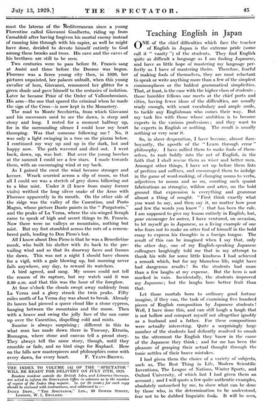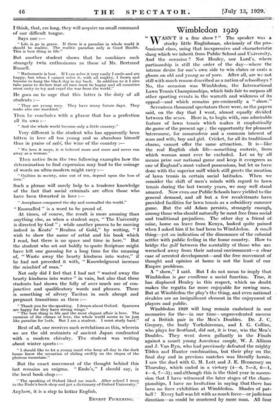Teaching English in Japan O NE of the chief difficulties which
face the teacher of English in Japan is the extreme pride (some call it " vanity ") of the students. They find English quite as difficult a language as I am finding Japanese, and have as little hope of mastering my language per- fectly as I have of mastering theirs. Therefore, fearful of making fools of themselves, they are most reluctant to speak or write anything more than a few of the simplest cbminonplaces or the baldest grammatical simplicities. That, at, least, is the case with the higher class of students those humbler fellows one meets at the chief ports and cities, having fewer ideas of the difficulties, are usually ready enough, with scant vocabulary and ample smile, to tackle any Englishman who comes their way. But my task lies with those whose ambition is to become experts in the various professions ; and they want to be experts in English or nothing. The result is usually nothing or very near it. So, in sheer desperation, I have become, almost flam- boyantly, the apostle of the " Learn through error " philosophy. I have rallied them to make fools of them- selves, to rush boldly into the net of English, in the faith that I shall rescue them as wiser and better men. Amongst other things, I have set up before them lists of prefixes and suffixes, and encouraged them to indulge in the game of word-making, of changing nouns to verbs, adjectives to nouns and so on, courting such quaint fabrications as strongize, wildom and arter, on the bold ground that expression is everything and grammar almost a thing of nought. "First think exactly what you want to say, and then say it, no matter how poor and few the words you know " : that has been the rule. I am supposed to give my lesson entirely in English, but, pour encourager les attires, I have ventured, on occasion, to let myself go in Japanese, as a living example of one who fears not to make an utter fool of himself in the bold essay to express his thoughts in a foreign tongue. The result of this can be imagined when I say that, only the other day, one of my English-speaking Japanese colleagues laughingly told me that in my attempt to thank his wife for some little kindness I had achieved a remark which, but for my blameless life, might have had dangerous results ! So the students had more than a few laughs at my expense. But the hero is not mocked in vain. Incidentally, the students improved my Japanese; but the laughs bore better fruit than that.
Let those mortals born to ordinary good fortune imagine, if they can, the task of examining five hundred pieces of English composition by Japanese students ! Well, I have done this, and can still laugh a laugh that is not hollow and comport myself not altogether ignobly as a husband and a father. For these compositions were actually interesting. Quite a surprisingly large number of the students had defiantly resolved to smash to the uttermost the English they know in the cause of the Japanese they think; and for me has been the pleasure of grasping their actual thought through the tonic nettles of their brave mistakes. I had given them the choice of a variety of subjects, such as, The Best Thing in Life, Modern Scientific Inventions, The League of Nations, Winter Sports, and Oxford University, of which last I had given them an account ; and I will quote a few quite authentic examples, absolutely untouched by me, to show what can be done by those who, in the determination to be understood, fear not to be dubbed linguistic fools. It will be seen, I think, that, ere long, they will acquire no small command of our difficult tongue. - Says one :— • " Life is go in grave. If there is a paradise in whole world it should be realitic. The realitic paradise only is Good Health. This is best thing in life."
But another student shows that he combines such strangely twin enthusiasms as those of Mr. Bertrand Russell.
" Mathematic is best. If I can solve it very easily I smile and am happy, but when I cannot solve it, with all mighty, I frown and become to hang the black dog in my back. In addition to it I also take pains to declare that all men must be happy and all countries must unity to try and expel the war from the world."
He goes on to urge that this latter is the duty of all students :—
" They are young men. They have many future days. They make also one mankind."
Then he concludes with a phrase that has a perfection all its own :— " And the whole world become only a little country."
Very different is the student who has apparently been bitten in love all too young and so abandons himself thus in praise of sake, the wine of the country :-- " We love it more, it is beloved more and more and never run away as a woman."
Then notice frcm the two following examples how the determination to find expression may lead to the coinage of words an ultra-modern might envy :— " Guilties in society, nine out of ten, depend upon the loss of love."
Such a phrase will surely help to a tenderer knowledge of the fact that social criminals are often those who have been thwarted in love :- "Aeroplanes conquered the sky and ensmalled the world."
" Ensmalled " is a word to be proud of.
. At times, of course, the result is more amusing than anything else, as when a student says, " The University is directed by God " ; while another proves to be moving indeed in Keats' " Realms of Gold," by writing, " I wish to show the name of artist and his book which I read, but there is no space and time in here." But the student who set out boldly to quote Scripture might have left one guessing for a long time for the meaning of, " Waste away the hearty kindness into water," if he had not preceded it with, " Knowledgment increase the mischief of man."
Not only did I feel that I had not " wasted away the hearty kindness into water " in vain, but also that these students had shown the folly of over much use of con- junctive and qualificatory words and phrases. There, is something of silvery Tacitus in such abrupt and pregnant transitions as these :— " Thank you for the speaking. I dream about Oxford. Sparrows are happy for they have strong wings."
" The best thing in life and the most elegant affair is love. The moment of the climax of love, the whole world seems to be just like paradise for both. But I am a student. I must study hard."
Best of all, one receives such revelations as this, wherein we see the old restraints of ancient Japan confronted with a modern chivalry. The student was writing about winter sports :— " I should like to let a young maid who keep all day in the dark house know the sensation of sliding swiftly on the slopes of the glorious mountain."
But the exact movement of the thought behihd this last remains an enigma. " Endo's," I should' say, is the local book-shop :— " The speaking of Oxford liked me much. After school I went. to the Endo's book-shop and got a dictionary of Oxford University."
Anyhow, it is a step to better English.
ERNEST PI eKERINd.'

































 Previous page
Previous page